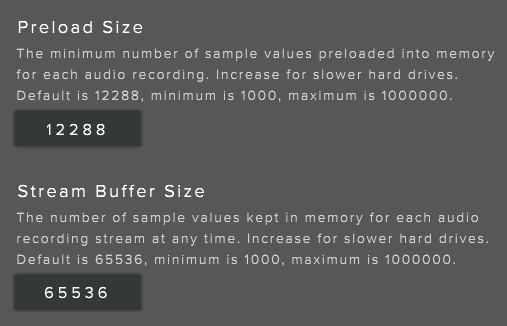I’ve just noticed that when controlling two or more instances of the same Spitfire library (dedicated plugin, not Kontakt), there are audio dropouts when playing notes that are available in both of those techniques.
Repro sequence :
- Add two Instrument Tracks with the same Spitfire instrument (VSTi, not Kontakt)
- Make sure All MIDI Inputs is selected,
- Make sure the tracks are record enabled/monitored,
- Press some keys on your keyboard.
Result → Audio dropouts occur.
These are not your average audio dropouts due to a performance overload, although the Peak meter makes a spike when this happens. Here the dropouts only occur when pressing and releasing the keys, and only when the tracks are monitored, and this happens both when playing live with a keyboard or when playing MIDI tracks.
Additionally, the issue only occurs when the notes have the same start and end positions (which happens naturally when playing with a keyboard). If you record MIDI on both tracks at the same time, audio dropouts will occur on playback, because the notes will be perfectly aligned.
However, when moving the notes a little in one MIDI Part, then the issue will go away !
Repro sequence :
- Record MIDI notes on the two tracks at the same time,
- Make sure the tracks are monitored,
- Hit play.
Result → Audio dropouts occur.
- In one of the two MIDI Parts, select all the notes and move them a bit.
Result → Audio dropouts do not occur anymore.
OR (with the notes still aligned) :
- Deactivate record enable/monitor.
Result → Audio dropouts do not occur anymore.
The issue is 100% MIDI related because the buffer size doesn’t play any role in this, the cracklings only occur on Note On and Note Off messages, whether the buffer is set to 64 or 2048.
Also, it doesn’t happen on every note pressed or read, this is random, although it becomes more frequent at lower buffers. And if I use different libraries on each track, this does not happen at all, so this is definitely not a CPU overload / performance problem.
This issue alone is extremely concerning, it really makes it impossible to play multiple techniques at the same time, for example Celli + Violins so that I can use more of the keyboard range.
So, is the issue coming from Cubase or Spitfire ?
Could some people please test this on their system ?
EDIT : Please see Post 25 for further details.
